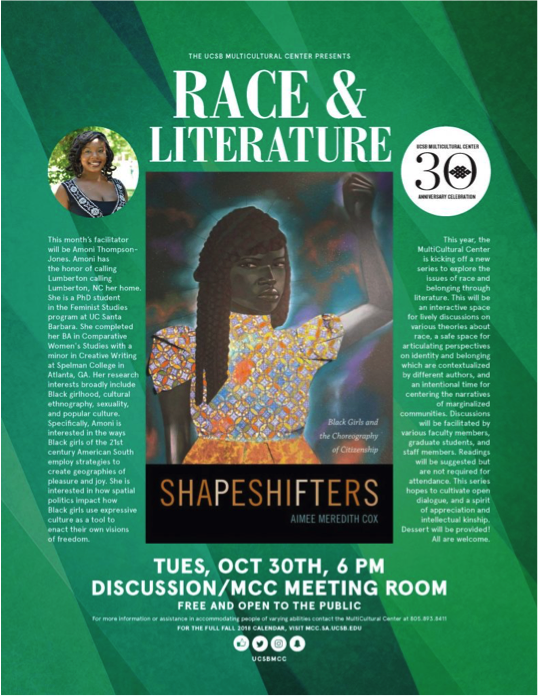By Caitlin Shoemaker
Societal pressures often shape girls of color into women they don’t want to be, says Feminist Studies scholar Amoni Jones.
Pictured above is the month of October’s flier for the Race and Literature Event (mcc.ucsb.edu).
“It is very necessary to talk about race, and black girls are often left out of the conversation,” said Jones, who recently facilitated the MultiCultural Center’s first Race and Literature event at UC Santa Barbara. The monthly event explores race using various literary works.
Jones is a Feminist Studies doctoral student, who has worked with underprivileged African-American girls in her hometown of Atlanta, Georgia. She used the novel Shapeshifters, by Aimee Cox, to talk about the struggles young black women face growing up, and to show that society often stereotypes girls of color and forces them into roles they don’t want to be in.
Cox is currently a professor of African- American studies at Yale University, and has carried out extensive research on African-American women in low-income neighborhoods. She focuses on the intersection of Black Studies, Anthropology, and Performance Studies.
Cox’s book Shapeshifters tells the story of several African-American girls growing up in a homeless shelter in Detroit. The girls face challenges during their time there, from finding a sense of belonging in a world that only sees them as partial citizens, to confronting the over-sexualization of their bodies.
During the UC Santa Barbara discussion, facilitator Jones talked about the stereotypes and preconceived narratives many African-American women have to overcome. “Just like the girls in the novel, many black girls are trying to self-make in spaces that already have a narrative for them,” Jones said.
Jones told the group that as girls of color are growing up, they constantly battle stereotypes and must overcome obstacles if they want to deviate from the path society creates for them. “Black girls grow up watching over sexualized black females in music videos, which is a horrible way for them to learn how to be women,” she said. Girls of color are told from a very young age that their bodies are the definition of “sexy” and they will have a harder time being seen as “respectful members of society,” she added.
Jones urged black girls and women to reject the stereotypes given to them, and say ‘no’ to outsiders telling them what to do.
“Black girls need to learn to say ‘no’, and walk away from spaces they know don’t serve them,” Jones said. They will then be able to determine who they want to be, and not conform to who others think they should be.
Feminist Studies scholar Amoni Jones (left) reads a passage from the book “Shapeshifters” by Aimee Meredith Cox.
Jones also used Shapeshifters, to talk about a lack of information and literature about women of color. Aimee Cox writes that most discussions about black youth only talk about African-American boys and men. “Girls and young women, if they are mentioned at all, are cited as either victims of the actions taken by black men and boys or one of the primary reasons why black men and boys have it so hard,” Cox writes.
Jones said black women are left out of discussions on race, and so have little opportunity to voice their opinions. They feel as if they are non-citizens, and can have a hard time finding a place in their communities. She stressed that talking about racial issues pertaining to women of color is crucial. “Cox’s purpose with her novel was to bring to light issues black females face, and add to the small body of literature available about black girls,” Jones said.
At the end of the discussion, Jones also posed a number of questions for members of the audience. “What role does storytelling play in social issues?” Jones asked.
One member of the audience, Diondre Miles-Hercules, a Linguistics major at UC Santa Barbara said narratives are key. “The way we study people so scientifically only gives us a snapshot of their lives. If we knew their narratives, we would have a better idea of who they are and why things happen in their lives,” she said. Storytelling takes us away from talking about people as statistics. The audience can peer into their lives and begin to care about what is happening to them, Miles-Hercules said.
After the discussion, English major Shayla Monroe said she benefited from the event. “I felt like this was a very safe space to talk about race, and hear different opinions about racial issues,” Monroe said.
The next Race and Literature event will be held on Tuesday, November 27th at 6 p.m. in the MCC Meeting Room. Rick Benjamin, a professor of literature and poetry at UC Santa Barbara, will facilitate a discussion on Kindred by Octavia E. Butler.
Caitlin Shoemaker is a fourth-year Economics and Accounting student who covered this event for her Writing course Journalism for Web and Social Media.
The MultiCultural Center’s next Race and Literature Event takes place on November 27 (mcc.ucsb.edu).




